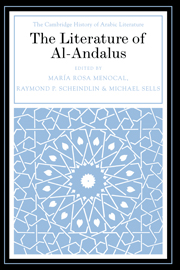Book contents
- Frontmatter
- 1 Visions of al-Andalus
- PART I THE SHAPES OF CULTURE
- PART II THE SHAPES OF LITERATURE
- PART III ANDALUSIANS
- PART IV TO SICILY
- 20 Poetries of the Norman courts
- 21 Ibn Ḥamdīs and the poetry of nostalgia
- 22 Michael Scot and the translators
- PART V MARRIAGES AND EXILES
- PART VI TO AL-ANDALUS, WOULD SHE RETURN THE GREETING
- Index
- References
20 - Poetries of the Norman courts
from PART IV - TO SICILY
Published online by Cambridge University Press: 28 May 2012
- Frontmatter
- 1 Visions of al-Andalus
- PART I THE SHAPES OF CULTURE
- PART II THE SHAPES OF LITERATURE
- PART III ANDALUSIANS
- PART IV TO SICILY
- 20 Poetries of the Norman courts
- 21 Ibn Ḥamdīs and the poetry of nostalgia
- 22 Michael Scot and the translators
- PART V MARRIAGES AND EXILES
- PART VI TO AL-ANDALUS, WOULD SHE RETURN THE GREETING
- Index
- References
Summary
The Normans seized Muslim-controlled Sicily during the eleventh century and established the “Kingdom of the Two Sicilies” (that is, the island on one hand and the southern tip of the Italian mainland on the other), a state that blended Muslim, Eastern Christian, and Western Christian institutions and cultural influences, and culminated during the reigns of Roger II (1130–54), William I (1154–66), and William II (1166–89). William II left no heir to the throne, and on his death the state was thrown into confusion as battles over succession erupted. In 1198, after nineteen years of civil unrest during which various Norman and German contenders battled for control of Sicily, four-year-old Frederick II, the son of German king Henry VI and Roger’s daughter Constance, was crowned king of Sicily.
The Norman state was strong, and many of its institutions survived the interregnum between William II and Frederick. However, cultural production in Sicily came to a temporary end. At the court of Frederick II, Sicilian culture would be brilliantly revived. The historical relationship between Sicily and the Muslim world and the prestige attached to the Arabic scientific tradition made that tradition particularly appealing to Frederick. He brought translators and learned men to Sicily from other lands; scientific texts were imported for translation, then exported to other European cities. He circulated a series of philosophical questions to Arabic scholars.
- Type
- Chapter
- Information
- The Literature of Al-Andalus , pp. 375 - 387Publisher: Cambridge University PressPrint publication year: 2000

